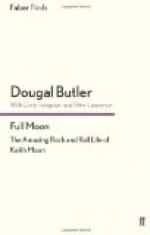“What is your London address?”
Austin took a card from his case and laid it on the table. Barrant picked it up, glanced at it, and said: “Is your son likely to be there?”
“He may be, but he said nothing to me about going there. He has his own liberty of action, like every other young man of his age. May I ask the reason of these questions, Detective Barrant?”
Barrant did not choose to reply. He drew Inspector Dawfield to the doorway and conferred with him in an undertone. Austin saw Barrant slip the card into his colleague’s hand, and Dawfield then hastened away. The inference was plain. Dawfield had been sent off to intercept the flight or start the pursuit. Austin found himself profoundly hoping that his son was by that time out of England.
He had not much leisure to think of that, for Barrant turned towards him again with an annoyance that he did not attempt to dissemble. “Why has your son gone to London—perhaps you can tell me that much?” he exclaimed.
“I gathered from him that it is his intention to look for his cousin Sisily.”
“For what purpose?”
“Because he strongly believes in her innocence.”
“It is strange that he should have rushed off like this.”
“Without waiting for your visit, do you mean? Really, Detective Barrant, may I constrain you to give me some explanation of all this? I want to help you all I can, but your actions savour too much of a peremptory jack-in-the-box, even in these bureaucratic days. What is the object of this visit? Why did you want to see my son?”
“I wished to interview him.”
“About what, may I ask?”
Barrant did not immediately reply, but Austin, scanning him furtively, sought to reach his thoughts by the varying shades of expression on his face. It was the state of mind of a man who was at once chagrined, amazed, suspicious, and wondering. The older man could picture Barrant thinking to himself: “This man before me—how far is he involved in this?” And, watching him mutely, Austin steeled himself for a sudden outburst: “You picked up the key. You declared it was suicide. What does that mean—now?”
But he under-estimated Barrant’s intelligence. Barrant had no intention of doing anything so crude. The situation was sufficiently awkward as it stood without putting the father on his guard. Austin might guess that he was under suspicion as well as his son, but that did not matter so much. Barrant instinctively realized that flight was impossible for Austin Turold, though he might seek to warn his son not to go near their London home because the police were after him. But that was a warning which would be useless, for the police were ahead of him there. Barrant reflected that he gained nothing by not divulging the object of his visit when the inference of it was so transparently palpable. The disclosure might even serve a useful purpose by lessening Austin’s apprehensions in his own case. With this consideration in view he brought it out frankly—




